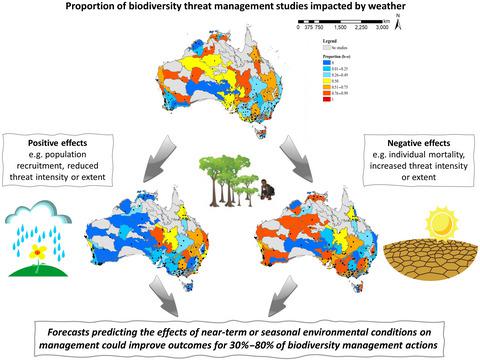当前位置:
X-MOL 学术
›
Glob. Change Biol.
›
论文详情
Our official English website, www.x-mol.net, welcomes your feedback! (Note: you will need to create a separate account there.)
Ecological forecasts to inform near-term management of threats to biodiversity.
Global Change Biology ( IF 11.6 ) Pub Date : 2020-07-11 , DOI: 10.1111/gcb.15272 Ayesha I T Tulloch 1 , Valerie Hagger 2 , Aaron C Greenville 1
Global Change Biology ( IF 11.6 ) Pub Date : 2020-07-11 , DOI: 10.1111/gcb.15272 Ayesha I T Tulloch 1 , Valerie Hagger 2 , Aaron C Greenville 1
Affiliation

|
Ecosystems are being altered by rapid and interacting changes in natural processes and anthropogenic threats to biodiversity. Uncertainty in historical, current and future effectiveness of actions hampers decisions about how to mitigate changes to prevent biodiversity loss and species extinctions. Research in resource management, agriculture and health indicates that forecasts predicting the effects of near‐term or seasonal environmental conditions on management greatly improve outcomes. Such forecasts help resolve uncertainties about when and how to operationalize management. We reviewed the scientific literature on environmental management to investigate whether near‐term forecasts are developed to inform biodiversity decisions in Australia, a nation with one of the highest recent extinction rates across the globe. We found that forecasts focused on economic objectives (e.g. fisheries management) predict on significantly shorter timelines and answer a broader range of management questions than forecasts focused on biodiversity conservation. We then evaluated scientific literature on the effectiveness of 484 actions to manage seven major terrestrial threats in Australia, to identify opportunities for near‐term forecasts to inform operational conservation decisions. Depending on the action, between 30% and 80% threat management operations experienced near‐term weather impacts on outcomes before, during or after management. Disease control, species translocation/reintroduction and habitat restoration actions were most frequently impacted, and negative impacts such as increased species mortality and reduced recruitment were more likely than positive impacts. Drought or dry conditions, and rainfall, were the most frequently reported weather impacts, indicating that near‐term forecasts predicting the effects of low or excessive rainfall on management outcomes are likely to have the greatest benefits. Across the world, many regions are, like Australia, becoming warmer and drier, or experiencing more extreme rainfall events. Informing conservation decisions with near‐term and seasonal ecological forecasting will be critical to harness uncertainties and lower the risk of threat management failure under global change.
中文翻译:

生态预测,为生物多样性威胁的近期管理提供信息。
自然过程的快速和相互作用的变化以及对生物多样性的人为威胁正在改变生态系统。行动的历史、当前和未来有效性的不确定性阻碍了关于如何减轻变化以防止生物多样性丧失和物种灭绝的决策。资源管理、农业和健康方面的研究表明,预测近期或季节性环境条件对管理的影响的预测可以大大改善结果。此类预测有助于解决有关何时以及如何实施管理的不确定性。我们回顾了有关环境管理的科学文献,以调查是否制定了近期预测来为澳大利亚的生物多样性决策提供信息,澳大利亚是全球近期灭绝率最高的国家之一。我们发现,与关注生物多样性保护的预测相比,关注经济目标(例如渔业管理)的预测所预测的时间要短得多,并且回答的管理问题范围更广。然后,我们评估了有关 484 项行动的有效性的科学文献,以管理澳大利亚的七种主要陆地威胁,以确定近期预测的机会,从而为运营保护决策提供信息。根据采取的行动,30% 到 80% 的威胁管理操作在管理之前、期间或之后经历了近期天气对结果的影响。疾病控制、物种迁移/重新引入和栖息地恢复行动最常受到影响,物种死亡率增加和补充减少等负面影响比正面影响更可能发生。干旱或干旱条件以及降雨是最常报告的天气影响,这表明预测降雨量过少或过多对管理结果的影响的近期预测可能会产生最大的好处。在世界范围内,许多地区,例如澳大利亚,正在变得更加温暖和干燥,或者正在经历更多的极端降雨事件。通过近期和季节性生态预测为保护决策提供信息对于利用不确定性和降低全球变化下威胁管理失败的风险至关重要。变得更温暖、更干燥,或经历更极端的降雨事件。通过近期和季节性生态预测为保护决策提供信息对于利用不确定性和降低全球变化下威胁管理失败的风险至关重要。变得更温暖、更干燥,或经历更极端的降雨事件。通过近期和季节性生态预测为保护决策提供信息对于利用不确定性和降低全球变化下威胁管理失败的风险至关重要。
更新日期:2020-07-11
中文翻译:

生态预测,为生物多样性威胁的近期管理提供信息。
自然过程的快速和相互作用的变化以及对生物多样性的人为威胁正在改变生态系统。行动的历史、当前和未来有效性的不确定性阻碍了关于如何减轻变化以防止生物多样性丧失和物种灭绝的决策。资源管理、农业和健康方面的研究表明,预测近期或季节性环境条件对管理的影响的预测可以大大改善结果。此类预测有助于解决有关何时以及如何实施管理的不确定性。我们回顾了有关环境管理的科学文献,以调查是否制定了近期预测来为澳大利亚的生物多样性决策提供信息,澳大利亚是全球近期灭绝率最高的国家之一。我们发现,与关注生物多样性保护的预测相比,关注经济目标(例如渔业管理)的预测所预测的时间要短得多,并且回答的管理问题范围更广。然后,我们评估了有关 484 项行动的有效性的科学文献,以管理澳大利亚的七种主要陆地威胁,以确定近期预测的机会,从而为运营保护决策提供信息。根据采取的行动,30% 到 80% 的威胁管理操作在管理之前、期间或之后经历了近期天气对结果的影响。疾病控制、物种迁移/重新引入和栖息地恢复行动最常受到影响,物种死亡率增加和补充减少等负面影响比正面影响更可能发生。干旱或干旱条件以及降雨是最常报告的天气影响,这表明预测降雨量过少或过多对管理结果的影响的近期预测可能会产生最大的好处。在世界范围内,许多地区,例如澳大利亚,正在变得更加温暖和干燥,或者正在经历更多的极端降雨事件。通过近期和季节性生态预测为保护决策提供信息对于利用不确定性和降低全球变化下威胁管理失败的风险至关重要。变得更温暖、更干燥,或经历更极端的降雨事件。通过近期和季节性生态预测为保护决策提供信息对于利用不确定性和降低全球变化下威胁管理失败的风险至关重要。变得更温暖、更干燥,或经历更极端的降雨事件。通过近期和季节性生态预测为保护决策提供信息对于利用不确定性和降低全球变化下威胁管理失败的风险至关重要。



























 京公网安备 11010802027423号
京公网安备 11010802027423号